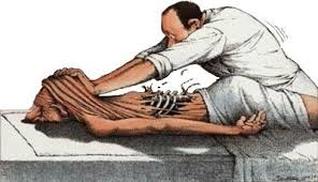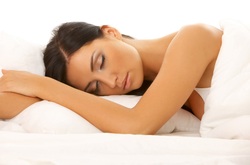 DEEP TISSUE v's DEEP PRESSURE Over the past 12 years of studying and receiving various forms of massage and bodywork I have learnt what works and what feels good for my body. Not only do I devote my time to practicing the art of bodywork I also spend a lot of time studying anatomy and physiology and theoretical principles of massage and bodywork. One of the biggest pet peeves I have with massage/bodywork is the seeming confusion over deep tissue and deep pressure. I love deep tissue massage, deep pressure not so much.....anyone can prod and stick a thumb or elbow into parts of the body and elicit a strong sensation does that mean it's deep tissue? Absolutely not! Deep tissue should aim to reduce and release restrictions and often that takes longer than an hours treatment (but that's for another post). Deep tissue is generally not something that can be done throughout the whole body (not in an hour anyway) it's a slow and specific process of sinking down through the layers of tissue, feeling a response in the tissues and sinking a little more if the tissues allow. Deep pressure is where the therapist forces the tissue a particular way, as with most things push with enough force and you will meet resistance, which actually then defeats the overall purpose of receiving massage. Any skilled therapist will tell you that they get much better results by allowing the tissues time to soften and release slowly over time, providing just the right amount of resistance for the release to be felt, which is unique to each client. Deep tissue is a method of communication and is very much a two way conversation, deep pressure however I liken to a monologue. As a clinical and sports massage therapist I attract a lot of active and sports people who often have a "no pain, no gain" mentality, which is an old school approach, perpetuated by therapists carrying on treating in a way that is not only NOT the most beneficial way of treating soft tissue but in my opinion ethically wrong, causing bruising, pain, feeling the need to hold the breath, curl the toes and grimacing are all signs that the pressure is too deep. As many of my clients know I'm continuously updating my skills and looking for the most effective techniques to not only reduce pain and to improve range of motion but techniques that also feel good to the client. I've been on a lot of continuing education courses with world class teachers and not once have I been on a course and had a teacher recommend to go as hard as possible to cause pain, 20 years ago that may have been different however, but we learn and we move on with updated views and ways of working with the body. That's not to say that when working with trigger points and restrictions and stickiness in fascia that there will be no discomfort felt but on a pain scale of 1-10, (1 being the lowest 10 highest) sensation should never be over a 6-7, often equated to that sweet spot and great results can be made even lower than that. The next time you are receiving massage or some form of bodywork ask yourself is the therapist having a conversation with your body's tissues or is it a monologue with the therapist imposing unnecessary pressure.
1 Comment
Each day is a little life: every waking and rising a little birth, every fresh morning a little youth, every going to rest and sleep a little death.  Ahh there is nothing quite like getting a good nights sleep. You feel refreshed and ready for the day, during sleep we are enhancing our learning and memory and even helping us to look our best as all our cells are given the necessary time to regenerate. I wrote in the last blog post the importance of making sleep a priority and wanted to go into more detail in this blog how vital to all of our bodily systems sleep is and if you have trouble sleeping some tips to help get the best sleep you can. Stress causes poor sleep and poor sleep causes stress. Depending on the number of hours sleep someone has had can determine how we react to stress both big and small, if we have had a good nights sleep prior to a stressful event we are more likely to be able to cope in a better way than if we have been sleep deprived. Lack of sleep has been know to cause all sorts of health disorders from lowered immune systems, weight gain, fatigue, moodiness, increased risk of accidents, concentration and memory problems, depression and other mood disorders, diabetes mellitus and metabolic disorder, your risk of developing cancer rises and you are 45% more likely to have a heart attack if you have 5 hours or less sleep a night. So how do we know if we are sleep deprived? If you have any of the following you may be sleep deprived:
Do any of those sound familiar to you? So what can we do to develop a healthy sleep routine?
1. Value sleep enough to go to bed. So often when we lead busy lives we put sleep at the bottom of our list of priorities, who can afford to spend so much time sleeping anyway? But creating enough time to sleep can positively affect not only our health but also our quality of life, who wants to spend our life's constantly cranky and tired? 2. Go to bed around the same time every night preferably about 10pm. It is thought that for every hour you are asleep before midnight it is equivalent to two hours sleep. As well as going to bed at the same time try to wake at the same time each day too, even the weekends! 3. Avoid stimulants in the evening. It is well known that caffeine, alcohol and nicotine all disrupt sleep, not only making it harder to get to sleep but also prevents deep sleep which will cause disrupted sleep. 4. Stop watching TV or using the computer after 8pm. Many programmes and movies are high action and very stimulating and without us even being aware of it can cause a release of adrenalin making it very hard to wind down and even if they are not obviously visually and mentally stimulating these activities stimulate the brain rather than helping the mind to calm down. The artificial blue lights from screens also disrupts and can inhibit the release of melatonin which is needed to regulate your circadian rhythms. 5. Create a bedtime routine. Transition into a relaxed state and create a ritual around bedtime. Around an hour before bedtime run a warm bath, while the bath is running you can perform abhyanga (oil massage) on yourself which according to Ayurveda is very grounding. Adding relaxing oils such as lavender, neroli or chamomile to the bath can enhance the relaxing benefits. You may find journaling before bed helpful for releasing any worries you may have so you don't take your stress into your sleep world. Listening to relaxing music or white noise may be helpful to soothe your mind. Any relaxation techniques, meditation, restorative yoga or breathing techniques that you know would all help to calm and soothe the mind and begin to tap you into your parasympathetic nervous system or what is also known as the rest and digest system. 6. Create the perfect sleep space. Keep anything non sleep related away from the bedroom, so no work or computers or TV's. Make it a relaxing space, a dark, quiet, cool environment is ideal. 7. Exercise. Exercise is a great stress buster whether its a brisk walk or an hour in the gym, just make sure not to do it too soon before bedtime, if possible try and exercise earlier on in the day. 8. Massage. Massage is highly relaxing and can be a great way to de-stress the body and mind from tension. 9. Yoga Nidra. Yoga Nidra or yogic sleep is a deeply relaxing guided relaxation that rotates your consciousness around your body allowing you to release deep seated tension. So many of us go to bed full of all the tensions and worries that we've accumulated throughout the day hoping that sleep will help us feel refreshed upon waking when in fact if we don't release those stresses before we sleep our sleep won't be as be restful as it can be and we will often wake feeling groggy and not as refreshed as we can be. 30 minutes of yoga nidra is equivalent of 3-4 hours sleep. (Look out for a Yoga Nidra YouTube clip coming from KMTC soon). What are your favourite bedtime routines? Or what have you found helpful to promote a wonderful sleep? |
AuthorAdvanced clinical massage therapist and yoga teacher. Archives
December 2023
Categories
All
|
 RSS Feed
RSS Feed